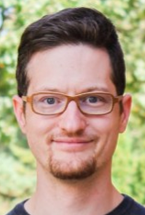Dominic Groß / University of Wisconsin-Madison
website
dominic.gross@wisc.edu
Title: Control and end-to-end stability analysis of converter dominated power systems
Date: June 27, 2022
Bio: Dominic Groß is an Assistant Professor with the Department of Electrical and Computer Engineering at the University of Wisconsin-Madison, Madison, WI, USA. He received his Ph.D. degree in Electrical Engineering from the University of Kassel, Germany, in 2014. Prior to joining UW-Madison, he was a postdoctoral researcher at the Automatic Control Laboratory of ETH Zürich. He received an NSF CAREER award in 2022. His research interests include distributed control and optimization of complex networked systems with applications in low-inertia systems and converter-dominated power systems.
Abstract: At the heart of the transition to a zero-carbon power system is a technological paradigm shift from conventional bulk generation to distributed renewable generation connected to the grid via power electronics. The rapid and massive integration of heterogeneous converter-interfaced renewable generation results in significantly different power system dynamics and challenges standard operating paradigms, system models, and controls. This talk will focus on recent results on universal grid-forming controls are compatible with a wide range of emerging and legacy technologies and form the basis for scalable end-to-end analytical stability certificates for converter-dominated power systems. In this general setting challenges arise from a lack of precise models at the system-level (i.e., network topology) and device-level (i.e., dynamics induced by proprietary controls). The talk concludes with an outlook on opportunities for certifying dynamic stability of converter-dominated power systems using data.
Learning Materials: Talk FlyerTalk Slides
Interacting Materials:
- Papers
- Frequency Stability of Synchronous Machines and Grid-Forming Power Converters
- Placement and Implementation of Grid-Forming and Grid-Following Virtual Inertia and Fast Frequency Response
- The Effect of Transmission-Line Dynamics on Grid-Forming Dispatchable Virtual Oscillator Control
- A Lyapunov Framework for Nested Dynamical Systems on Multiple Time Scales With Application to Converter-Based Power Systems
- Power-Balancing Dual-Port Grid-Forming Power Converter Control for Renewable Integration and Hybrid AC/DC Power Systems
- Control of Low-Inertia Power Systems
- Videos
- Frequency Stability of Synchronous Machines and Grid-Forming Power Converters
- Placement and Implementation of Grid-Forming and Grid-Following Virtual Inertia and Fast Frequency Response
- The Effect of Transmission-Line Dynamics on Grid-Forming Dispatchable Virtual Oscillator Control
- A Lyapunov Framework for Nested Dynamical Systems on Multiple Time Scales With Application to Converter-Based Power Systems
- Power-Balancing Dual-Port Grid-Forming Power Converter Control for Renewable Integration and Hybrid AC/DC Power Systems
- Control of Low-Inertia Power Systems
Krankenversicherungsvergleich
